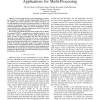111 search results - page 16 / 23 » Performance pathologies in hardware transactional memory |
138
click to vote
ASPLOS
2012
ACM
13 years 7 months ago
2012
ACM
Emerging fast, non-volatile memories (e.g., phase change memories, spin-torque MRAMs, and the memristor) reduce storage access latencies by an order of magnitude compared to state...
115
click to vote
PARCO
2003
15 years 1 months ago
2003
Three different partial differential equation (PDE) solver kernels are analyzed in respect to cache memory performance on a simulated shared memory computer. The kernels implement...
112
click to vote
ECRTS
2009
IEEE
14 years 9 months ago
2009
IEEE
While hardware caches are generally effective at improving application performance, they greatly complicate performance prediction. Slight changes in memory layout or data access p...
IISWC
2008
IEEE
15 years 6 months ago
2008
IEEE
Abstract—Transactional Memory (TM) is emerging as a promising technology to simplify parallel programming. While several TM systems have been proposed in the research literature,...
118
click to vote
ISCA
2011
IEEE
14 years 3 months ago
2011
IEEE
As we move to large manycores, the hardware-based global checkpointing schemes that have been proposed for small shared-memory machines do not scale. Scalability barriers include ...

